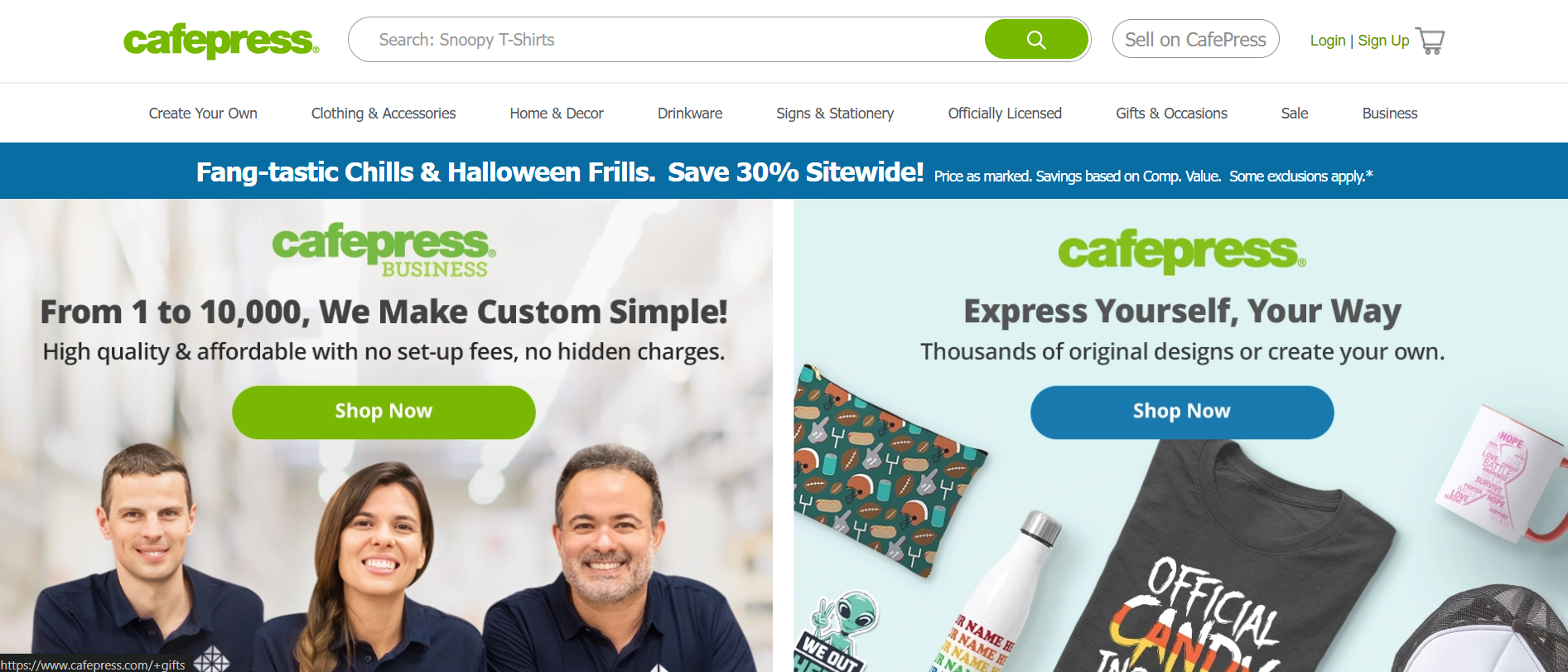Cafepress
CafePress is one of the pioneers in print-on-demand, founded in 1999, offering artists, designers, and everyday creators the ability to sell custom designs on thousands of products. It combines a large online marketplace with customizable shops where sellers can upload graphics, slogans, or artwork and earn royalties on every sale. Known for novelty gifts, funny tees, and personalized items, CafePress remains a solid choice for creators who focus on humor, pop culture, and themed merchandise. Below you’ll find how CafePress works, its key features, pros & cons, success tips, and top alternatives.
How CafePress Works
CafePress allows users to create and sell designs on a massive variety of print-on-demand products — from apparel and mugs to home décor and accessories. You can sell through the main CafePress Marketplace or open your own Shop to showcase a themed collection or brand. When a customer makes a purchase, CafePress handles the printing, packaging, shipping, and customer service while paying you a commission for each sale. The platform is well-suited for humor-driven, pop-culture, and slogan-based designs that appeal to casual buyers and gift shoppers.
Founded: 1999
Cost: Free to join (premium shop upgrades available)
Payout: Royalties or profit margin per sale
Audience: General consumers, gift shoppers, humor & pop-culture fans
Integrations: Built-in shop system, affiliate program, and marketplace listings
Key Features
Massive Product Variety
CafePress offers one of the largest POD catalogs — from apparel and drinkware to bumper stickers, ornaments, and tote bags.
Marketplace + Shop Options
Sell in the CafePress Marketplace for organic traffic or create a branded shop to control presentation and niche focus.
Personalization & Gifting
Many products allow customers to add text or choose design variations — ideal for personalized gift markets.
Pros & Cons
Pros
- One of the oldest and most trusted POD brands
- Huge selection of customizable products
- Multiple selling options — Marketplace and Shops
- Strong appeal for humor and gift-related designs
- Automatic production and global fulfillment
Cons
- Website design feels outdated compared to newer platforms
- Highly competitive marketplace with limited organic exposure
- Lower profit margins compared to newer POD services
- Limited branding and layout control for shops
Best For
Designers who focus on humor, text-based slogans, pop-culture, and niche gift products. CafePress is especially suitable for creators who want a large, established platform with low entry barriers and wide product variety.
Pricing & Royalties
CafePress pays creators through royalties — either a fixed commission per sale or a percentage based on markup. You can choose between Marketplace listings (standard royalties) or a custom Shop (where you can set your own prices and margins). Payments are processed monthly, typically via PayPal.
Content & IP Guidelines
CafePress has strict intellectual property policies. Do not upload copyrighted images, brand logos, or characters without permission. Parody and humor are allowed within fair use limits, but content must comply with CafePress’s content and trademark policies.
Practical Tips to Succeed
- Focus on humor, trending phrases, or evergreen slogans — they perform best on CafePress.
- Use keyword-rich titles and descriptions to improve search ranking inside the marketplace.
- Create multiple niche-focused shops rather than one broad store.
- Leverage seasonal holidays (Christmas, Valentine’s, Mother’s Day) for themed collections.
- Keep designs simple, bold, and easy to read on smaller products.
Where CafePress Fits in Your POD Stack
CafePress works well as a legacy POD platform with wide exposure and massive product diversity. It’s especially effective for humor, slogans, and niche designs that appeal to gift shoppers. For more modern design-oriented audiences, pair CafePress with Redbubble or TeePublic to balance reach and style.
Alternatives
FAQ
Is CafePress free to join?
Yes. You can create a free account and list products instantly, with optional paid shop upgrades for more control and branding.
Can I set my own prices?
Yes, in your own Shop you can set margins and prices; however, Marketplace listings follow CafePress’s standard royalty structure.
What sells best on CafePress?
Funny quotes, political humor, pets, hobbies, and holiday-themed products tend to perform the best with CafePress’s audience.
